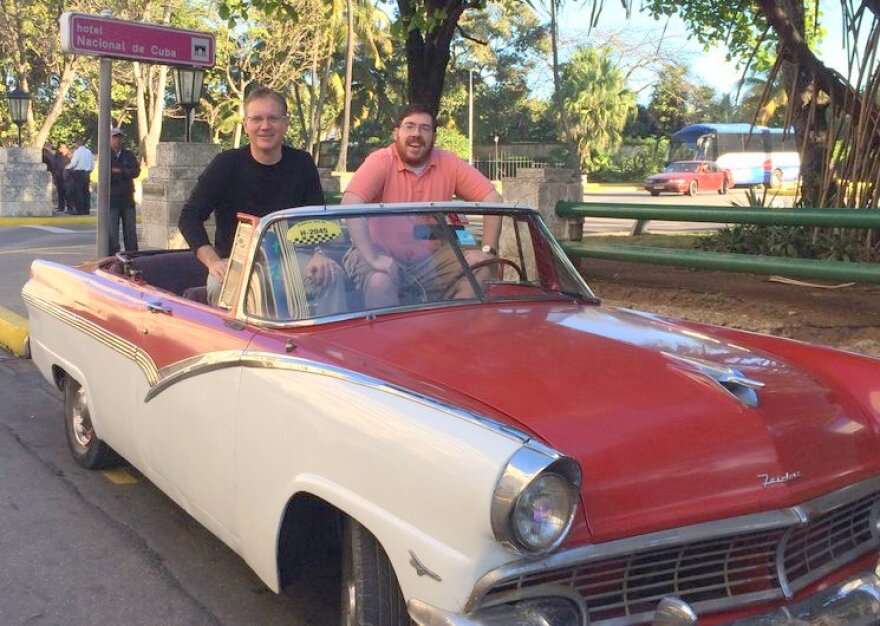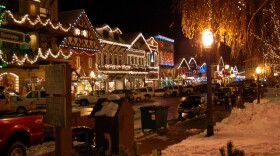Editor's Note: KPLU's Ed Ronco and travel expert Matthew Brumley spent a week in Cuba, along with approximately 30 KPLU listeners, at the beginning of February. This week's "Going Places" is a reflection on that trip, written by Ed Ronco.
The view from the north-facing windows of Havana's Hotel Nacional looks at Cuba's most famous sidewalk, the Malecon. Here, joggers dodge crashing waves from the Atlantic Ocean on stormy afternoons, and young couples walk quietly, hand-in-hand, during the breezy night. On the weekends, it's busy with people of all ages drinking rum, smoking cigars, talking, singing, laughing and dancing. It stretches five miles along the shore of this country's capital city.
This walkway, wedged between an aging sea wall and a modern avenue, is as good a place as any to explore Cuba's contradictions. The traffic is a mix of new Chinese tour buses and old 1950s American cars. Presidents, stars and royalty stay at the Nacional, a place where you can get rum at any hour on the back porch, but where drinking the tap water is a bad idea.
Our week in Cuba included many contradictions. Don't get me wrong — we traveled well, ate well, and were treated well by everyone we met. There are few foreign cities where I've felt safer than in Havana, even with large sums of money on me to deal with its cash-based economy. But there were also signs of immense poverty. Buildings that looked abandoned were, in fact, fully functional apartment towers. Cubans are not allowed to own fishing boats, and the ones they're permitted to use carry motors too weak to take them too far away.
At dinner one night, one of our travelers mentioned that she felt some initial hesitation about coming to Cuba. Would the money she spent — on souvenirs, on food, on lodging — just end up lining the pockets of the government rather than benefiting the citizens? We come from a country where we're often encouraged to "vote with our wallets," sometimes by withholding support from businesses whose practices we find unethical or wrong.

Matthew Brumley has made nine trips to Cuba in his time as a tour leader, so I asked him about those concerns. The good that comes from Americans traveling to places like Cuba far outweighs the bad, he says.
"By traveling to places like Cuba or Zimbabwe, you're mostly just supporting the locals," Brumley said.
And while we paid for lodging at government-owned hotels, we also patronized private restaurants and brought gifts for musicians, students and others. These items, ranging from viola strings to soap, can be extremely hard to acquire within Cuba.
But more than the items, we built personal connections with the people we met. It might sound corny and cliché, but music really is a universal language, and it's hard not to sing along when a Cuban teenager plays John Lennon's "Imagine" on the piano, or Sinatra's "My Way" on the trumpet.
It's hard to stay still when members of the legendary Buena Vista Social Club still rock out at a nightclub as the clock moves toward midnight.
"Having that connection is the thing you return home with. Not the architecture or the food, but the moment where you have that connection," Brumley said. "It's priceless."
For as long as I've known Brumley, he's believed in this kind of travel. He says when you go to a place and meet the people who live there, you break down barriers. Maybe you don't change the world. Powerful governments will still do things to show each other how powerful they can be. But, he says, the more we understand each other, the better off the world will be, if only incrementally.
On the ground in Havana, the conflict between Cuba and the United States seems more governmental than interpersonal. During President George W. Bush's administration, the enormous building housing the U.S. Interests Section — the closest thing we have to an embassy in Cuba — displayed pro-democracy slogans in its windows. Letters five feet tall spelled out "Democracia en Cuba!" within view of a large stretch of the Malecon. The Cuban government responded by putting up scores of giant flag poles to block the phrases.
Today, the American slogans are gone, but the Cuban flagpoles remain.
Cuba is about to change in big ways ("Starbucks will be nice. Three-hundred Starbucks might not be nice," one Cuban said), and the future is uncertain, even if relations between the two countries is less chilly.
Within Cuba, on an individual level, Americans seem welcomed as any other foreign visitor. And some of the Cubans we met talked about Dec. 17, 2014 as a historic day.
That's the date President Barack Obama announced the thawing of relations with Cuba.
---
Matthew Brumley is the founder of Earthbound Expeditions, which organizes group travel to destinations around the world for various clients, including KPLU. "Going Places" is our new travel segment exploring all aspects of getting from Point A to Point B. Tell us what you think about responsible travel, or suggest topics for future installations of this series. Have a travel hangup or a tip? Let us know in the comments.







